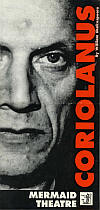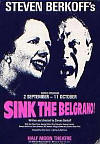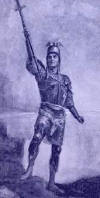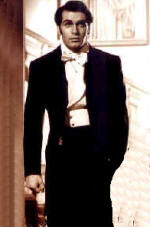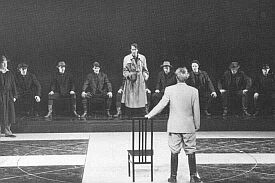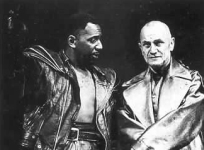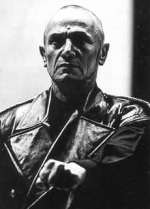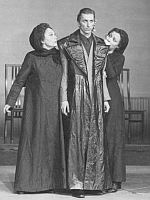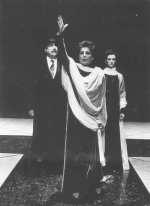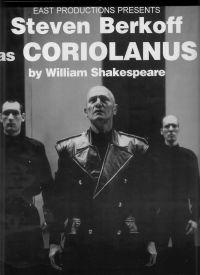|
home
advanced |
Like a Warrior by Ken Lauter
[Henry Irving]
ran his theatre like a warrior.
That persona is impossible to convey fully in words alone, but we can approach it by focusing on his rendering of one of Shakespeare’s most troubling and eccentric characters. Berkoff’s vision of the Roman hero and traitor was grandly idiosyncratic. Here was a new Coriolanus? as a strutting, macho, campy yet thoroughly menacing Mussolini. Here was a man who? in spite of immense ego, martial ruthlessness, abject (and even at times comical) submission to his mother? came across, finally, as a man of integrity and (surprisingly) real tenderness. Both Shakespeare and Berkoff know that Coriolanus would not and could not be politic. He was a warrior? and nothing but a warrior. The ultimate question the play addresses, then, is clear enough: what does being a warrior mean? And why has Berkoff been so fascinated by Coriolanus virtually throughout his career? [04]
1. The Berkovian Warrior
For Berkoff, such questions are synonymous with asking what it means to be a man? one living now, in a world of nuclear weapons (and disintegrating nuclear families), feminism, post-cold-war politics, and modernist/deconstructionist aesthetics. Berkoff suggests that someone who fights to maintain his personal integrity, honor and courage is still living “like a warrior.” The like, however, is crucial. If you take the term warrior too literally, Berkoff’s work will seem crude and anachronistic; if you don’t take it as a measure of real things in the real world, you trivialize him. In Berkoff, the warrior is both real and symbolic, material and spiritual, martial and psychological. And living like one is neither simple nor easy. Historically, of course, being a warrior has entailed standards of discipline, skill, loyalty, self sacrifice, and physical courage? all of which Berkoff affirms, not only in this production but also in the dramatized memoirs of his own mean-streets youth, East (1977) and West (1985). In the former, which he subtitles “Elegy for the East End / and its energetic waste,” Berkoff remembers: “you would fight to the death to defend that particular lifestyle that was your own.” [05] And of “schtarker” hero Mike in West, Berkoff says: “Mike’s truth is to live for simple principles and to put his courage where his mouth is. He defeats the Huxton monster [a gang leader] and will continue to fight monsters so that others can rest safe in their beds.” Coriolanus fights the Volcian “monster” Aufidius in much the same spirit.
It is certainly true that Berkoff productions are often marked by extreme violence, terror, and images of war. Yet when examined closely, these elements are as polemically “anti-war” as the poetry of Wilfred Owen. Berkoff sees the mother-son reconciliation scene in Coriolanus as “one of the great anti-war scenes in drama.” [09] In fact, what he does in this play is to transform “the warrior” into a metaphor for the state of the soul? and one of his subtexts is precisely Owen’s notion that the Roman adage dulce et decorum est pro patria mori [10] is a vicious deception, “the old lie.” Ironically, Berkoff exposes this lie by presenting us with a character who will not, who cannot, see it as such.
With such intriguing clues in mind, I suggest that in Coriolanus Berkoff continues his pursuit of the theme of genuine maleness, grappling with the idea that for men as men, the fullest possible (and perhaps only honorable) life can come only by serving a demanding “warrior code,” a life without compromise or self-betrayal. But betrayal is, in fact, at the heart of Shakespeare’s play. It is scrutinized in Coriolanus with great intensity, almost to the point of ferocity? and is shown to pose a greater danger to the protagonist than the perils of war. Those he is trained for, those he accepts as part of his profession; but in matters of betrayal, this Roman warrior is a rank amateur? or more precisely, as I show later, a boy. * * * The classical view of the play? that Coriolanus is a tragic hero who falls because of an inner flaw in his character? is, if not entirely discarded, radically revised by Berkoff. He recognizes that this Roman bull is a great dramatic challenge? a cold, sneering, “politically incorrect,” narrow-minded aristocrat. Wyndham Lewis calls him “the incarnation of violent snobbery.”[12] This actually gets it backwards, since Coriolanus worships merit, not class, but it catches the tone of the character pretty well. He certainly is, as D.A. Traversi says: “possibly the most disconcerting and incongruous of all Shakespeare’s heroes.” [13]
First, Coriolanus is never dissembling, never Machiavellian. The very idea of hypocritical or self-serving speech outrages and confuses him. He hates making speeches of any kind (particularly to those he has contempt for): “He would not flatter Neptune for his trident / Or Jove for’s power to thunder.” (III, i) In Coriolanus’s code, the only life for a true Roman is the challenge of total self-sacrifice, to defend the state from its enemies, to fight to the death. For Coriolanus, the warrior motto of dulce et decorum est is not a lie? it is a living truth. Better a noble death than a cowardly life, always. Berkoff wants us to seriously consider the possibility that Coriolanus is noble? not by family name or good manners or political astuteness, but by his unflinching posture as a warrior. He says of his arch enemy Aufidius, “I sin in envying his nobility.” For this Roman general, conforming to the warrior’s code is nothing less than a kind of spiritual aspiration. Moreover, for him, Rome is its martial nobility? and if not that, nothing. Those who don’t measure up to this standard are parasites, enemies of the state. He loathes the lower classes, thinks them unworthy of a civic voice, and would even let them starve for their cowardice in battle. So when his own standing as a Roman is finally subverted by the Machiavellian tribunes [15], Rome itself becomes “the enemy”? and Coriolanus can join his old enemies freely and “untraitorously” (in his own eyes) because the Volcians are still warriors. They have not betrayed the warrior’s high calling. Once with the Volcians, Coriolanus certainly wants revenge on Rome, but we feel it is at least in part a just revenge. Berkoff therefore wins us over to him almost against our will? not totally perhaps, but very strongly. [16] * * * Whatever else we may think of Coriolanus, it is perfectly clear that the knavish tribunes are right about him in one thing: he is not fit for political leadership, except possibly as a dictator (hence the Mussolini costume) [17]. Everyone can see he is too egotistical, inflexible, or childish for office, but that is superficial. Berkoff’s daring performance convinces us that Coriolanus is unfit for politics precisely because he is too noble? if by noble we mean a man who is totally absorbed by his role. “Let me play/the man I am” is Coriolanus’s anthem. That is, let me be a soldier, a fighter, a killer if need be? but honor me for doing it by never asking me to curry favor from cowards or hypocrites for political gain. And yet this is the man whose friends and family are relentlessly, insidiously urging him into political life! In the end, Coriolanus is betrayed, not by his flaws but by his virtues (“Rights by rights founder, strengths by strengths do fail,” IV, vii), and not by his old enemy Tullus Aufidius, but by his “friends”? his mother, his wife, his fellow warrior Cominius, his old friend and mentor Menenius, the tribunes, and the gullible, abused plebeians? in short, by virtually the entire Roman state. Such a sense of betrayal is a terribly exasperating vision for today’s liberal, democratic, submissive, corporate citizen and casual theatre goer. And worse, it might easily slide into a vision of macho martyrdom. The only thing that prevents that from happening is laughter.
2. Berkovian Laughter
This production was full of the raw, audacious farce that Berkoff is so expert at? and which evoked salty laughter almost from beginning to end. The laughter comes in many forms, some of which are Shakespeare’s usual pit-pleasing puns and gambols, others the brilliant physical comedy of mime and choreography. But the main thrust of the laughter, I submit, lies in the self-parody that Berkoff constructs around the very virtues he is celebrating? the prowess, honesty, crudeness, and even the terror of warriors. Coriolanus may be a hellion, Berkoff asserts, but that doesn’t mean he can’t be riotously funny? mostly at his own expense.
This view of the character has no basis in Shakespeare. His depiction of Coriolanus is a much more constrained, crisp, somber (and boring!) Roman than we saw on stage at the Mermaid. Shakespeare was no doubt fascinated by the man, a killing machine whose mother was clearly the source of his tiger-like ferocity; and there is also in the text a sense that Coriolanus was wronged by his fellow citizens and that they deserved some measure of the wrath he finally turns on them. Still, I don’t think Shakespeare liked Coriolanus or wanted him to be liked. He is, in Shakespeare, more of a force of nature than a man, a foil to his own lost humanity and dissolved loyalty to his nation. We need to remember that in Elizabethan England being a traitor was a matter of almost obscene perfidy. But Steven Berkoff likes Coriolanus? and wants us to like him. The miracle of the production is that this ambition is realized? even though we also fear Coriolanus and laugh both with and at him. Again, we like him primarily because, to adapt what Iago says (falsely) about himself, Coriolanus “is what he is”? a kick-ass soldier, a patriot, a good son, a hard, brave man who won’t suffer fools or cowards lightly. Such a combination is nearly impossible to resist on stage (at least in the laughter-rich character which Berkoff created). The laughter redeems his crudity. It almost redeems his cruelty. It humanizes him, and finally, gives us the secret of his soul, illuminating Berkoff’s vision of what it means for a man to live like a warrior. What we see, ultimately, is that real warriors can laugh at themselves? even unto death. [18]
Berkovian laughter is most often generated, however, by Coriolanus’s vituperative outbursts [19]. They are passionate, impolitic, and hysterically funny. Even his great renunciation scene, ending with the triumphant rejoinder to those who have just expelled him from his beloved Rome, was played for a laugh by Berkoff. This famous speech begins with concentrated loathing (“You common cry [pack] of curs, whose breath I hate / As reek o’th’ rotten fens, whose love I prize / As the dead carcasses of unburied men”? III, iii). But Berkoff ended it with an ear-splitting, hyper-paused “I... BANISH... YOU!” This put the rest of the ensemble on their heels, their eyes dazed full moons. It was hilarious and fearsome at the same time? something only an actor with Berkoff’s brazen presence (and powerful lungs) could pull off. It’s a mistake, though, to consider these outbursts merely childish. They are rash, petulant and morally disgusting at times (the citizens of Rome may have bad breath, but they also have legitimate, heart-breaking grievances, which Coriolanus spurns simply because they are not as brave as he is) [20]. But it is love, honor, and pride that animate the general’s outbursts. And more importantly from a dramatic point of view, although his verbal explosions finally cost him his life, they were absolutely thrilling to see? which tells us how badly we crave making them ourselves. Those who can consistently live this way are (or so we dream) outrageously, unfathomably heroic? even when they are funny, and even in an age as cynical and despairing as ours. Berkoff writes:
Berkoff’s Coriolanus was pretty ghastly himself at times (e.g., when he cooly twisted an arrow out of the throat of an enemy soldier)? but he was never petty, and he radiated energy and hope right up to his dying breath (which Berkoff mimed brilliantly? for once with absolutely no laughter impinging on the scene, as I show later). It also should be noted that? in spite of the fact that its Coriolanus was definitely a “gangsta” general? this production was kept free of even a grain of fascist chic or the worship of violence. This was accomplished, among other ways, by one of the brilliant pieces of mime in the production? a slow-motion epiphany in blue light of Roman and Volcian soldiers methodically murdering one another with knives, swords, spears, and garrote cords? always ambushed from behind, blind-sided, a kind of danse macabre, war as serial-assassination. This haunting, almost unbearable sequence (all Berkoff, of course, not Shakespeare) was as devastating an “anti-war” statement as it could be? quite a trick in a play whose protagonist was made so strangely endearing and grand precisely because he’s both a Rambo-like fighter and an impious comedian [22]. In any case, it’s absolutely clear that Berkoff was not engaging in any Nietzschean fantasies of the warrior as Obermann? the play’s insistent, raucous laughter is one guarantee of this. Another guarantee was the production’s unique dramatization of gender.
3. Berkovian Gender-Bending
Gender images and inversions of them were perhaps the most important, original element in the production. This is a subtle thing to convey. If you have seen Berkoff’s rampant virility on stage? and how suddenly and convincingly he can shift into a thoroughly feminine tenderness, the point is self-evident. But what can we say analytically? Are we to think that Coriolanus and Aufidius are gay? Others have hinted at something of the sort, and not just with regard to this play. Wyndham Lewis again:
Lewis’s “demented” is homophobic of course, but he does point to something real? only to get it all wrong once again. Berkoff shows us just how wrong? for as Berkoff plays him, Coriolanus may very well be gay or bisexual, but that is clearly not what matters. What matters is that he is a tremendous warrior who lives his code with a ferocious joie de vivre and integrity that even his worst enemy acknowledges and envies. There certainly was an ample, strident sensuality in Berkoff’s Coriolanus; but he was not ridiculous? he was awesome. His submissive or “effeminate” nature (registered most obviously in his submission to Mother Volumnia), far from seeming demented was the most human thing about him (though often comic). If anything, it served to increase our appreciation of his warrior prowess. For instance, when Coriolanus storms through the gates of Corioli by himself [24]? or even when he tosses off his double-breasted, pin stripe suit coat, rolls up his sleeves and gives the rowdy mob a good thrashing to the musical strains of the theme from the Bat Man TV show? we are all the more impressed that this farcical punishment is being administered being by a man who speaks of real combat as if he were speaking of sex: it’s luscious, it’s irresistible, it’s what makes life worth living for the warrior? a supreme high, a kind of “warrior drug.” [25] Such language may sound more like a bizarre army recruiting spiel than Shakespeare? but Berkoff stands on solid textual ground here. After Coriolanus has been banished from Rome, Aufidius (clearly an alter-ego to the hero) greets him in Antium with a note of sheer erotic ecstasy:
What a preposterous (but dazzling) piece of poetry! No historical figures? the homosexual armies of Sparta included? ever spoke like this [26]. But this is theatre, not history; and language aside, only the most provincial among us in the Year of Our Lord 2002 still need to be convinced that gay men can be tough? and as capable of military valor as John Wayne ever was. [27]
It wasn’t “queer Shakespeare” for shock value; it was gender-bending for the sake of dramatic truth: complexity, gradations, overlappings, and contradictions rather than rigid male-female dichotomies were what this production found in the warrior life. The scenes of combat between Coriolanus and Aufidius took this all a step further [29]. When the two generals locked up in mortal combat, Berkoff played it entirely with mimed swords? i.e. the actors wielded “invisible” weapons. There was no sound-effect for the clash of blades? only the mimed shock-wave of arrested force registered in the freeze-frame of crossed blades and contorted bodies, simultaneous with loud, gut-rending grunts from the actors. After each swing of swords, they stood momentarily face to face, eye to eye in this embrace, trembling in muscular exertion, sweating, growing red, breathing like race horses, pouring pure animal rage into each other’s eyes. It was, in short, an orgasmic image. What does Berkoff mean by it? On the one hand, I think he was simply rendering the rush of combat that some men experience? though not all, by any means [30]. Such a high is brought on simply by human biology? the so-called “fight-flight-or-fuck” neurophysiological response that occurs in the body under conditions of extreme stress [31]. This is the ultimate source of the homoeroticism in the play. It does not “explain” the play or Berkoff’s interpretation of it; but it gives us a context and vantage point from which to view the love-hate relationship that Coriolanus has with his greatest enemy. Thus when Aufidius finally kills Coriolanus, Berkoff staged it as a kind of mock sexual intercourse, with the Volcian warrior standing astride the supine body of his foe, plunging his mimed spear down in a furious spasm of consummation. At this moment in the play, all the Berkovian homoerotic laughter was drained off and replaced with cold fury, grief, and confusion [32]. Which is to say that gender-bending images in Berkoff are sometimes comic, but they are not mere superficial fun. Life contains more, finally, than gender or laughter can comprehend. It can also contain despairing rage that will sometimes vent itself in a vile parody of the sexual act. So when we see Aufidius “fucking” Coriolanus in the death scene, it is not pornographic mockery or camp Freudian symbolism. It is a moment of genuine human mystery and tragedy. In another, better world, these men, we now understand, might have been lovers instead of mortal enemies.
4. Berkoff’s Mothers and Sons
Coriolanus has a wife and mother, as well as an enemy. Where are the women placed in Berkoff’s gender universe? The wife Virgilia stays pretty much where Shakespeare puts her? at the margin. She has few lines and less dramatic impact [33]. She is the mother of the next Coriolanus, a boy who shreds butterflies for fun. Coriolanus is indifferent to her, and Shakespeare paints her and her friend, Valeria, in chilly colors [34]:
It is not Virgilia who stirs passion in Coriolanus? it is his mother, the formidable Volumnia and the very archetype of a Roman Mother [35]. In my view, she is the key to the play and the center of its gender images.
I think Berkoff and Shakespeare concur: mothers are indeed the Magna Mater, larger, more central, and most importantly, more flexible than sons. Volumnia is clearly warrior-like herself? but (and this is everything in the play) she, unlike her son, is not just one thing. Like Homer’s Odysseus, Volumnia, as her name hints, is polutropos? many skilled. She is a shrewd politician and a loyal, “nurturing” Roman (she would never attack her native city, Mother Rome). She does not confuse ends and means, as Coriolanus does so pitifully. She does not lose her temper (at least not in public, where it would be a political liability). She knows when to be still, when to compromise, when to cut her losses, when to sue for peace. She clearly would have made an able consul, or even Senator, herself. Why none of this is passed on to her male child is not stated or intimated in the play? but it is there, a fact looming as large as war itself and some men’s single-minded aptitude for it. These elements are most vividly traced in two scenes? one where Volumnia badgers Coriolanus into trying to gain a consulship, and in the reconciliation scene near the end when she saves Rome but dooms Coriolanus to his fate at the hands of the Volcians. The first is played comically by Berkoff, the second as sheer pathos. When Volumnia forces her son to curry the favor of the plebeians he loathes (III, ii), she exercises her mother’s prerogative in an almost merciless way. Surely, we think, she must see this can only end in disaster! But when Coriolanus whines his reluctance, she chides him: “Pray be counseled / I have a heart as little apt [compliant] as yours, / But yet a brain that leads my use of anger / To better vantage.” She is speaking here, not just as Mommy, but also as the perfect Machiavellian prince? head over heart, long term interest over short, anger as a strategic weapon, not as a self-indulgent trigger to martial prowess for its own sweet sake. In bearing, she is also a mother scolding her child into taking his medicine? he must hold his nose and swallow, damn it! This goes down with Coriolanus like treacle, of course, and Berkoff plays it with much mugging and grimacing, as Volumnia continues the siege:
Again, great poetry and sound political advice? but Coriolanus is someone who cannot dissemble with his nature; and so his answer to Volumnia is the pathetic cry of a boy being told he must stop playing and come in the house. “Must I?” he groans over and over again? but he’s no match for Mom. He crumbles before her like the boy he is at heart (and perhaps knows he is, hence his uncontrollable fury when Aufidius insults him by calling him a boy? i. e., not a warrior).
In the reconciliation scene (V, iii) where Coriolanus spares Rome for his mother’s sake, similar things occur, but with the comedy of grown-man-turned-peevish-boy entirely absent. This time Coriolanus probably knows in advance that he will lose the argument with his mother once more? and that the consequences will be fatal.
Now, the “dull actor” in Berkoff’s lexicon is one who does not perform like a warrior (as the dead metaphor “real trooper” implies? and hence the “full disgrace” to an admirer of Henry Irving.) The Olympus-molehill hyperbole is an extreme expression of the mother-son dynamics operating throughout the play. Here, Coriolanus, would-be sacker of Rome, salutes Volumnia as “the most noble mother of the world” and kneels to her? only to have her, to his horror, kneel to him! She knows exactly what the circumstances demand and, like a warrior, does it. But the pathos in her words, even as she ruins him, is immense: “Thou art my warrior; / I holp to frame thee” (my italics). This doesn’t mean that Mother V is about to go easy on sonny, however. She charges him with being on the verge of:
When Coriolanus still resists momentarily, Volumnia delivers the final blow:
Coriolanus simply collapses? responding with words that reanimate and enlarge other themes of the play:
Laughter again? but this time icy, abstract, “unnatural.” Berkoff rolled those “o’s” like the long, lonely howls of a wolf. It was an eerie effect? the confused, grief-stricken juvenile-male wolf being driven away from his mother’s den to fend for himself for the first time. (And note how beautifully Berkoff’s earlier comic wolf howl about Aufidius prepared us for this moment!) Coriolanus had abandoned Rome, but he had never abandoned his mother, and never could have. Perhaps he now understands that Volumnia is “Mother Rome,” the she-wolf that suckled Remus and Romulus. * * * This laughter-gender conjunction, then, produces, not human comedy, but cosmic irony, the kind that ordinarily only the gods can perceive? and inflict on mortals. Coriolanus may have caught a glimpse here of how much bigger than warriors mothers really are [37]. Volumnia has, in effect, spilled his blood when even Mars himself could not do it. (Aufidius is the actual executioner, but he is empowered by Volumnia’s prior spiritual defeat of her son.) Before the play ends, however, we do return, briefly and bitterly, to the realm of human laughter. The fatal insult that Aufidius hurls (“thou boy of tears”) is a blatant lie? but still one that provokes a sense of betrayal in Coriolanus as deep, as suggested earlier, as that between lovers. Taking the bait, Coriolanus snarls back:
A lot depends on how we hear the word boy in this speech. If we hear it as Berkoff wants us to? with ironic compassion? then the issues of gender and laughter align in a coherent, powerful way. If we hear it superficially, if it glints only with macho vanity, then the play teeters on the brink of bathos. It is at precisely this moment that the like of “like a warrior” is most delicately poised. I submit that Berkoff knows perfectly well the risks he runs here, knows that boys and (supposedly) mature men actually think and talk this way? and that, from a human point of view, it is pitiful that they do. At the same time, in Berkoff’s strong stage voice, these words can cut into almost any man’s soul, no matter how mature he is. There is irreducible biological programming under all the strutting bravado that Berkoff wants us to honor [38]. “Alone I did it.”? male vanity and male glory inextricably fused, a boast all the more silly and satisfying because it is true (we’ve seen it with our own eyes earlier in the play). Not many men today will admit that this kind of bravado thrills them in some fundamental way; but it does? and Berkoff, rather than denying it or euphemizing it, glories in it. Thus he has it both ways: he lets himself play warrior with grim ferocity? and invites us to laugh at and with him for doing so! This yielded some great theatre? and also a profound comment on gender in our times as well as Shakespeare’s [39]. What Coriolanus means is plain enough. (“I’m not a boy, I’m a warrior? and you damn well know it, Aufidius!”) But ironically, the accusation stands? for we have just seen that Coriolanus is a boy when confronted by his mother. Berkoff’s general, then, is in part a stereotypical spoiled brat, a rampant mamma’s boy. Yet in context? given that this boy has just relinquished his lust to burn Rome in revenge for its lack of appreciation of his valor? what does being a boy mean except that he is human, a creature of flesh and blood, laughter and tears, pride and humility, reason and emotion? and not just a remorseless warrior. This is all that saves Rome. It is all that saves any of us? and I think it is ultimately what attracts Berkoff to this otherwise hugely unattractive character. Coriolanus’s epitaph might read: “He loved his mother.” [40]
5. Death of a Warrior
The death scene in Berkoff’s Coriolanus was perhaps its most brilliant and violent moment? and its most audacious use of “physical theatre.” Here is what happens. First, several Volcian soldiers mime stabbing Coriolanus. He falls to the floor, on his back, head to the audience. Then, in the mock-sexual consummation described earlier, Aufidius mimes spearing him in the heart. At first, we think it is all over? but no!? Coriolanus moans, grabs the invisible spear which impales him, flexes up on his heels, and proceeds to slowly rotate on its axis 360 degrees until he lies head toward the audience again? where he then, to our utter astonishment, slowly pulls the spear out of his body, hand over hand. Then and only then he dies. It’s every actor’s dream. (Was there ever a death scene more over the top?) Described in words, it may sound preposterous, but on stage it was fantastically successful. It seemed to last forever, even though it only took a few minutes at most. You could hear a pin drop during it? except for a) the loud thuds of Berkoff’s boots on the floor as he slowly levered himself around on the spear, and b) his grunts of exertion at each rotation. On one level, this scene was macabre? an animal’s death, the last thrashing of a speared lion, an actor’s expression of supreme bravado, but ghastly and dream-like. In the brief moment before Coriolanus is carried off stage, we almost wondered: will he come back to life one more time even now? Then, when he didn’t, when we understood that it was only pure will that kept him going and that he was finally biologically dead, there was a crushing sense of despair that arose, an intimation of just how totally all things? gender and laughter included? are annihilated in death. But the play does not end with death? it ends with the funeral ode of Aufidius. As Coriolanus’s body is marched off on the shoulders of the Volcian troops, Aufidius loses his rage and laments: “Yet he shall have a noble memory.” After the play’s long detour into the world of the Mother, we are now back in the world of the warrior-code, the homage of one soldier to another. So the line has great ironic tension in it, coming from the man who called this warrior “boy” and then murdered him. Aufidius had once revered Coriolanus (“Thou noble thing!”), had loved him more than his bride. Now that he is dead and only a memory, he is noble once more. Warrior and child are one. This may be, in Hardy’s words, “wishing it might be so”? but in the power of the production it seemed fully justified. The line also bears comparison to the eulogy rendered to Hamlet (Berkoff’s “moral warrior,” remember). When Horatio bids farewell to Hamlet with “Flights of angels sing thee to thy rest,” he invokes the Christian mythology of afterlife, divine perfection, and absolute salvation. None of that obtains in the pagan setting of Coriolanus, where the dead live eternally only in memory; and though the memory of the warrior and his rigid code may be noble in its own way, in its boy’s dream of pure valor, here in the real world? with women and children in it? we can no longer accommodate him. He would burn Rome [41]. He is too absolute. The son must die, that the mother might live. * * * Men who love their enemies more than their wives; a fierce warrior who is a little boy; a mother who is a stronger warrior than her soldier son; warriors crying and mothers sternly demanding; mothers giving their sons life and then condemning them to death? these, I argue, are the tropes of gender at work in Shakespeare’s Coriolanus; and Berkoff exploited them as no one before him had, by bathing them in his own virile, keenly ironic laughter. Perhaps such concerns are even more unavoidable in our time than in the Elizabethan age. Ours, after all, is the era of global ecological disaster, ethnic cleansing, and mass starvation, all of which seem to elude correction by even our best-intentioned leaders? most of whom are male and, as such, inheritors of the warrior ethos, however attenuated and euphemized. If “the warrior” is to have a favorable memory at all, much less a noble one, he must die? and soon? that Mother Gaia might live. We all understand that by now, don’t we? Shakespeare saw it four hundred years ago. Berkoff sees it too? and makes us see it afresh. The warrior, he says, dies hard? unbelievably hard? but (to adapt a phrase from Dickens) he dies, thank god, he dies! Rome breathes easier with him gone. He could never have been content in the Pax Romana. However, Berkoff’s bravura death scene forces a final question to the surface of the play? and exposes the “like” in his “like a warrior” ethos once more, in a very poignant way. If Coriolanus had magically defeated death? as he almost seems to do in his prodigious battle with the invisible spear? or if he were resurrected in our own time, who would this warrior be today? A Black Ops guy or Navy Seal, maybe? but where in civilian life could he find the kind of passion and laughter which he once found in war? There’s only one place, of course: on the stage, playing himself in one of Shakespeare’s most moving and unnerving plays. What is the secret of Coriolanus’s soul? All we really know is that he is a creature of great passion? of great hates, to be sure, but mostly of great loves? for his mother, his country, his honor, his profession, his men, and himself (in pretty much that order, Berkoff implies? a radical reading of the play in itself!). What Coriolanus presents is an old, terrible paradox. Love and valor are simply not enough in life? and trying to live as if they were is pretty sure, sooner or later, to get you hated, banished, or even killed; but those who live without a supreme dedication to such values have, to some degree, murdered their own humanity, their honor, even their own salvation. This does not sound like a theme compatible with laughter, but in the genius of Berkoff’s theatre, it can be.
6. Coda - Berkoff´s Shakespeare and Ours
Just how unconventional is Berkoff? I would argue that this is not the best way to put the question. The real issue is: how unconventional was Shakespeare? My answer is: tremendously. In spite of his sometimes near-hysterical fear of regicide (and its flip side, flattery of the reigning monarch); in spite of the fact that he sometimes clings to a medieval world-view; and in spite of a misogynist moment or two? Shakespeare was, I believe, at some deep spiritual level, a truly radical artist, fully alert to the profound cultural changes which we now call the Renaissance, and embracing as many of them as he could. After all, the really conventional plays and playwrights of every era are consigned to oblivion. To last, in art, is to be “unconventional,” if not always in surface form, then in inspiration, in vision. Shakespeare may or may not be the writer most responsible for “the invention of the human” (as Harold Bloom rather glibly puts it [44]); but he has spoken to more of us over the last 400 years about what being human means than any other writer in English.
Berkoff has, I suspect, absorbed the Bard in a way that few of his peers have. In one interview, he remarks: “I love the language, I love the arias, the musicality. Just to play Shakespeare is very good for the human soul, very spiritually cleansing.” [46] These are hardly the words of a man whose sense of the unconventional is limited to costume, stage design, mime, or chances to ham it up (though he loves all that). Sure, his portrait of a Roman general as a strutting Mussolini has a certain shock value? pure theatricality, which the East-End tough in Berkoff no doubt delights in throwing in the face of the RSC Oxford-and-Cambridge crowd. But Shakespeare himself played to the pit more than once? and his raucous spirit of misrule (not just in Falstaff or Sir Toby Belch, but more radically and complexly in Caliban) is as much at the heart of his art as are the patrician musings of Hamlet and his Wittenbergian ilk.
Copyright © 2002 Ken Lauter |
